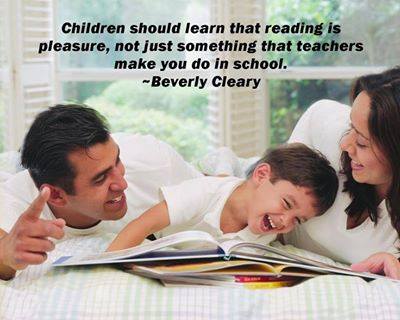Twelve months ago this week I began writing my first blog to help parents "Raise Awesome Readers." My goal was to assist and equip mums and dads with ideas that would make the learning process at home easier, less stressful and above all fun and enjoyable for both parents and their children. Learning to read (and write) does not begin and end when the school day is finished. It has to be a partnership between the teacher and family, with both providing role models, mentors and a warm loving, caring and supportive environment.
 Over the year I have posted many quotes on my facebook page encouraging the importance of families reading together. None more so than the one I posted today. "Children should learn that reading is a pleasure, not just something that teachers make you do in school. Beverly Cleary." Along with the quote is a delightful picture of a child and his parents reading together, laughing and genuinely enjoying the shared experience. This is exactly what I have been advocating all along. It is essential not only in the growth of the child but in his/her potential to want to learn to read. A happy child is encouraged and will strive as he/she is a confident child.
Over the year I have posted many quotes on my facebook page encouraging the importance of families reading together. None more so than the one I posted today. "Children should learn that reading is a pleasure, not just something that teachers make you do in school. Beverly Cleary." Along with the quote is a delightful picture of a child and his parents reading together, laughing and genuinely enjoying the shared experience. This is exactly what I have been advocating all along. It is essential not only in the growth of the child but in his/her potential to want to learn to read. A happy child is encouraged and will strive as he/she is a confident child.
My very first post on November 5, 2012, was titled Is the after school home reader a battle of wills?
I'd like to re-post it here now as a reminder that I do realise how difficult life can get trying to fit in home reading each day, but with a little pateince it is worth it in the end. Reading with your children can be a valuable, worthwhile experience, it is what we make it afterall.
Master six squirms on the lounge. He figdets and fiddles with the T.V. remote control , the cushions, anything he can get his hands on. He scratches his head while he turns, his ears are pricked to listen to the laughter of his older brother who is playing computer games in the next room. You desperately try to turn his attention back to the home reader at hand. So far he has managed to struggle through the first page. As usual this is going to be a long drawn out affair, a battle of wills.
You point at the next word, he rocks back and forth with a deep sigh. Just when you think the word is about to burst forth he cries out to the family dog instead. The dog wags it's tail and delighted with the attention, jumps up into his eager arms. They begin to rumble on the lounge. Son number three, (the baby of the family) is playing with blocks on the floor at your feet. Master six, now bored with the dog, slides off the lounge to join his younger brother, all thoughts of the home reader totally forgotten.
Time for you to take a deep breath, go make a cup of tea and re-group. He may have won the battle, but you can still win the war. A little love, time and patience can work wonders. Give him time to construct something amazing with those blocks, (little boys are hands-on creatures they need to be physical,) while you enjoy that soothing tea. Then come down to his level, join him on the floor. Make a word out of the blocks yourself, then ask Master six if he can make a word, any word he likes. If his classroom teacher uses sightwords, you should have a copy of the list. Suggest he makes a word from those, preferably one you know he can achieve. Start with the simple obvious words like mum, dad, dog, cat, anything that is familiar. Then introduce a word or two from the home reader. Before he realises it he has made a long list of words he knows. His confidence will grow triple fold.
Now re-open the home reader. Ask Master six if he can find each word one at a time on each page. If he finds a word, see if he can read it in the sentence or read the sentence together. before you know it. "hey presto!" he has "read" the entire book and he has had some fun along the way. :)
In the early years of learning to read, a home reader is one of the most important tools brought home from school. If read with a loved one evey day it really does make a world of difference in the development of the reading process. Children can get bored or frustrated with them when they are not changed regularly enough at school. Parents need to keep in mind that sometimes the school day has a very hectic schedule and the change of readers is not always possible. Parent helpers are always very much apprecaited. Don't forget to read other favourite books from home,(like Gingerbread Aliens a great early fun reader), libraries or swap with friends.
For further reading help and suggestions please read through some of my past blogs or drop by and leave me any questions or comments. I am always happy to help. :)

